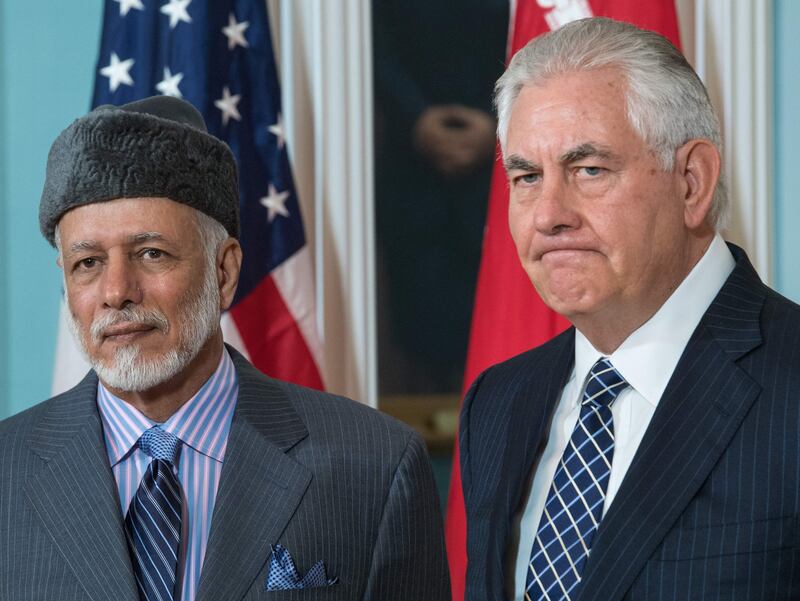Three days after US president Donald Trump's first call with Oman’s Sultan Qaboos, secretary of state Rex Tillerson hosted his Omani counterpart Yusuf bin Alawi in Washington on Friday, recognising the country’s role as critical liaison to Iran, according to experts.
Mr bin Alawi, on his first visit to Washington since Mr Trump took office, has held a series of meetings with congressional leaders and state department officials since Wednesday. His meeting with Mr Tillerson, one week after a visit to Iran where he met president Hassan Rouhani, highlights Oman’s traditional role as a facilitator between Washington and Tehran.
“The Trump administration, just like the Obama administration before it, may have come to recognise Oman's pragmatic relationship with Iran as a policy asset,” said Sigurd Neubauer, a non-resident fellow at the Arab Gulf States Institute in Washington.
“Oman is able to have a pragmatic relationship with Iran because of its historic relationship with the US,” he noted, being a “strategic ally for nearly two centuries, and one of two GCC countries (along with Bahrain) to enjoy a free-trade agreement with the United States.”
In comments before his meeting with Mr bin Alawi, Mr Tillerson kept his focus on the Qatar dispute. He referred to “positive movement” with Qatar’s amendments to its counter-terrorism law just a week after signing an agreement with Washington on combating terrorism financing.
“They have been very aggressive in implementing that agreement,” Mr Tillerson said, signalling also a possibility of direct negotiations between Qatar and the four Arab states boycotting it.
The US secretary of state suggested a reciprocal move from the other side in lifting the boycott that began on June 5. “I think it's a good sign if the four countries would do that. And I’m hopeful they’ll consider that seriously,” he said.
The comments, coming during Mr bin Alawi’s visit, suggest “that Washington may have requested Omani assistance to help negotiate an end to the GCC crisis”, according to Mr Neubauer.
Historically, Oman has played a critical role in facilitating talks with Iran. It was instrumental in secret talks over the nuclear deal in 2011. “Because of the Trump administration's rhetoric on Iran, it cannot deal with the Iranians directly as then secretary of state John Kerry did,” Mr Neubauer explained.
Oman could “serve as a trusted intermediary to pass messages between Tehran and Washington", he said.
Mr bin Alawi has already met Bob Corker, chairman of Senate Foreign Relations committee, and was also expected to meet Jason Greenblatt, the US special representative to the Israeli-Palestinian peace process.






